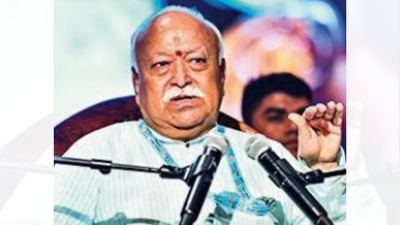ARTICLE AD BOX

BENGALURU: Rashtriya Swayamsevak Sangh (RSS) sarsanghchalak Mohan Bhagwat Sunday said the organisation is not unconstitutional and that it is a recognised body of individuals which need not be registered with the state. At the conclusion of a two-day lecture series here to mark 100 years of the RSS, BJP's ideological mentor, Bhagwat was responding to accusations that it's an unregistered organisation and to calls for a ban on the organisation and its activities in public places. "The laws of Swatantra Bharat (Independent India) do not make registration (of RSS) compulsory. We are categorised as a body of individuals... Legally and factually, we are an organisation," he said. On questions about the RSS status and Karnataka govt demanding a ban, Bhagwat said. "We're answering many questions, yet they are asked again and again. We've realised that criticism makes Sangh more famous." He said successive govts had banned Sangh thrice since Independence. "Courts restored our status all three times. Effectively, the govt recognised RSS and that is why it banned us," he said as the audience erupted in laughter.
The income tax department, too, had issued notices to RSS to pay taxes, but it was finally exempted by the state as it receives only gurudakshina (contributions) from sevaks, the RSS chief said. Dwelling into the RSS history, Bhagwat dismissed critics' demand for not registering the RSS, saying it was launched in 1925 in British-ruled India. "Did you expect us to register with the British govt, whom our then Sarasanghchalak was fighting?" he said. Responding to Bhagwat's remarks, Karnataka CM Siddaramaiah said his govt hasn't banned RSS. "Our order says private parties must seek permission to hold events and its doesn't mention RSS," he said. However, Priyank Kharge, states's IT minister, questioned, "How does RSS sustain its financial and organisational structure without being a registered entity?

 1 hour ago
5
1 hour ago
5









 English (US) ·
English (US) ·